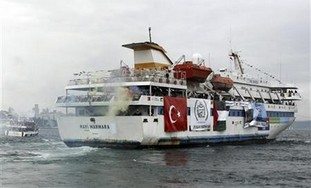By SETH J. FRANTZMAN
06/28/2011 22:31
The cancellation of the participation of the ‘Mavi Marmara’ in the Gaza flotilla and the mystery of what Turkey’s political elite is thinking.

Sometime this week, some 1,000 activists on one or two large Turkish ships accompanied by 15 other craft were to be making their way to Gaza. But they are nowhere on the horizon, although Israel has been preparing to prevent their breaking the blockade.
So what happened? Just a month ago, various “Free Gaza” blogs were ablaze with hopes for the latest flotilla. Gaza TV News and Freedomflotilla.eu both reported that the Turks were going to send not only the Mavi Marmara( the ship Israel boarded on May 31, 2010), but also another “1,000-ton-capacity aid ship.”
This phantom ship was supposed to set sail on May 31, 2011 to commemorate the fate of the first flotilla, in which nine Turkish activists were killed. Accompanying photos of the ghost ship showed a type of freighter. Alas, it seems the story was smoke and mirrors; if there was a ship, it never sailed.
One man who posted on a freedom flotilla blog noted: “We hope that the Turkish people who have always extended their helping hand to Gazans will also help the loading of this ship with their donations.”
Reliance on the Turks to provide the shipping capacity and spearhead the aid convoy has become a failing portion of the overall architecture of the Free Gaza Movement.
Specifically, it is the reliance on the financial muscle and political influence of Insani Yardim Vakfi (Foundation for Human Rights and Freedoms and Humanitarian Relief-IHH).
The IHH, founded in 1995 to support Bosnian Muslims, is an Islamic (probably Islamist) charity. In 2010 it purchased the Mavi Marmara and loaded it with 600 activists to sail to Gaza. The motives for its sudden interest in Gaza were never entirely clear. Its connections to the governing party of Turkey, Recep Tayyip Erdogan’s Justice and Development Party, were never entirely understood either. What is clear is that Ergodan reacted with extreme anger when nine activists died aboard the Marmara. In a June 2, 2010 speech before the Turkish parliament he raged “in an absolutely illegal way did they [Israel] attack, spilling the blood of innocent humans.”
Later he reportedly referred to the dead as martyrs, and seemed to infer that the flotilla’s actions had the consent of the Turkish government.
The IHH talked tough in the waning days of 2010 and through May 2011. Then it revealed that it would postpone sending any ships until after Turkey’s June 12 elections.
This intimated that it needed the approval of the ruling party, and also feared that sending its ships before the election could create a provocation that would harm Erdogan.
The decision to not send the ships came after two interesting occurrences on June 7.
First it was reported that Kemal Kılıçdarolu, leader of the opposition Republican People’s Party, had criticized the government for not thinking of the consequences of the Gaza flotilla’s actions. Then Ahmet Davutoglu, Turkey’s foreign minister (who was also standing for election), said: “The aid flotilla should wait to see what happens with the Rafah border crossing being opened, and to see how Israel perceives the new [Palestinian unity] government.”
Erdogan’s party handily won the June elections.
Then on June 17 the IHH’s leader, Fehmi Bulent Yildirim, noted that the flotilla would not depart because of technical difficulties; “the exact reason has nothing to do with the government or the state… the Israelis, unbelievably, damaged our vessel.”
Really? The ship was released by Israel and returned to Turkey in August 2010. Presumably if it had technical difficulties, the IHH would not have claimed so often that it would be sailing. When the IHH was asked why a smaller freighter it had purchased was not going to be joining the other freedom-flotilla craft, Yildirim claimed that this smaller ship had to accompany the Marmara, as if they were one package.
Indeed they are one Turkish package. The pathetic little fleet of sloops, yawls, dinghys, ketches and catboats that Western pro-Gaza groupies have arranged has neither the muscle, capacity nor headline-generating images needed to break the blockade or create any sort of international incidents. It is as if Admiral Nelson had been forced to bring only rowboats to Trafalgar to face French ships of the line.
But the real question remains: how to decipher this Turkish enigma? Already commentators have come to understand that the IHH’s actions are closely linked to the governing party, because the two organizations share a similar, Islamic-inspired political ideology.
It has also transpired that there are deep divisions in Turkish political circles over how wise it is to harm relations with Israel, particularly the secular opposition and the nationalist (i.e non-Islamist) daily Hurriyet have shown a willingness to challenge the Erdogan narrative. Davutoglu, who has always gained accolades for his deft handling of Turkish foreign policy, has revealed himself to be very pragmatic on the Gaza issue, realizing that the opening of Rafah negates the flotilla’s raison d’etre. But if all this pragmatism has suddenly come to the surface, what sort of judgment prevailed a year ago that allowed a cruise ship full of radical activists to depart for Gaza? What were the activists going to do if they actually got to Gaza? Rumors abound that Turkey wishes to be the mature leader of an Arab democratic awakening, and sees the Gaza issue as a side-show. Others speak of secret backroom talks between Israel and Turkey.
Nuh Yilmaz and Kilic Bugra, ham-handedly writing in Foreign Policy on June 21, claim “Turkey will continue to extend and deepen its ties with different political actors and the people of the Middle East.”
Such insight.
What’s going on in Turkey is a mystery, and that enigma should raise many eyebrows in Israel.
The writer has a PhD from Hebrew University, and is a fellow at the Jerusalem Institute for Market Studies.

Leave a Reply